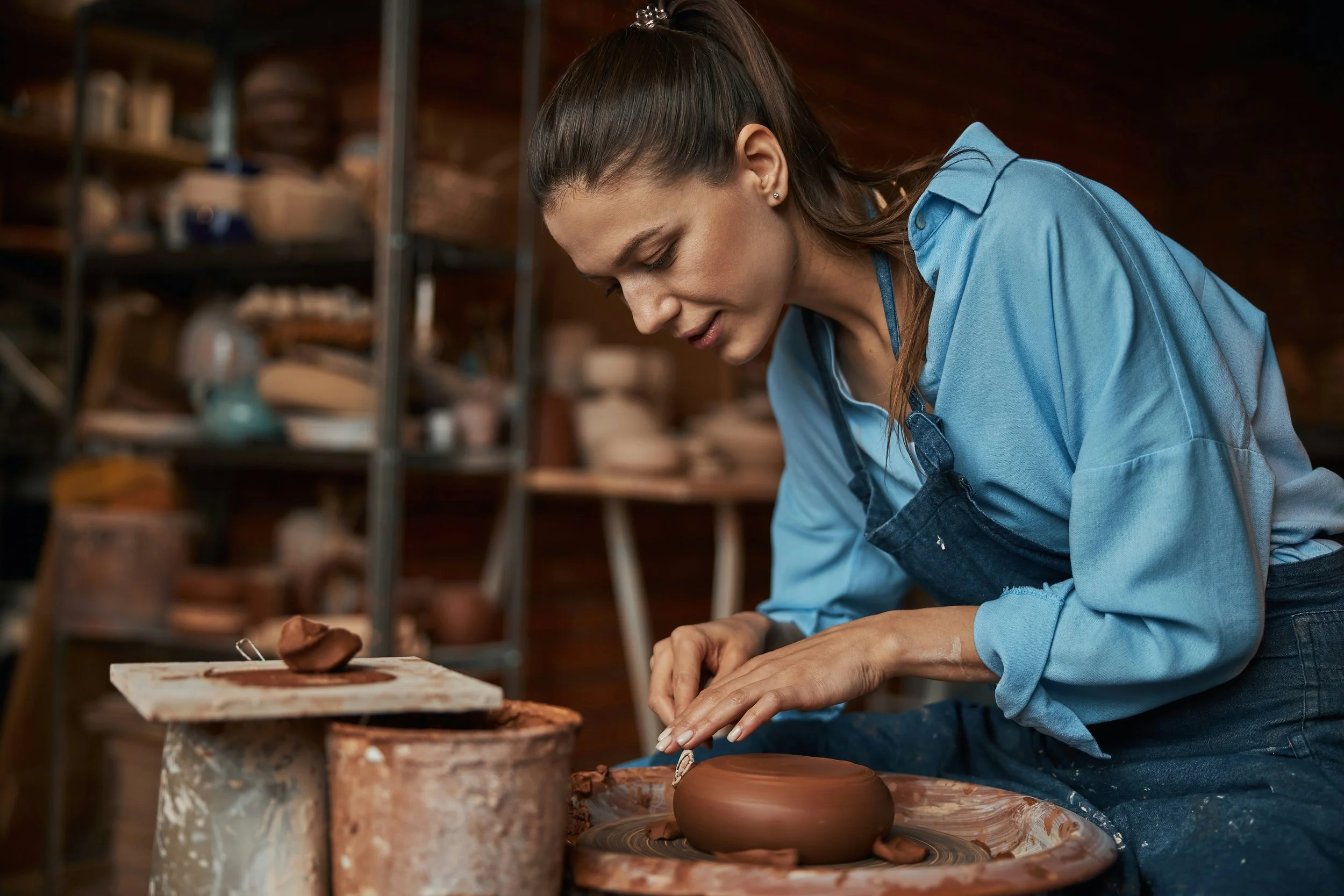THE IDENTIFIER | PEOPLE PLUS
ADVANCE DESIGN PROFILE
INTUITIVE DESIGN
INTUITIVE DESIGN
How you relate to others.
You Value Honesty and Authenticity in Relationships
You connect with people whom you perceive as honest and true. The qualities of honesty and truth hold significant value in all your relationships, whether they be work-related or close personal ones. You lean towards maintaining a small and close-knit circle of friends and family, exercising caution in choosing whom to trust and be vulnerable with. Surrounding yourself with things that align with your true self is essential, connecting around shared interests and outlooks in life. These shared interests not only help in creating deeper connections but also facilitate stimulating conversations. The magnitude of your close relationships is measured and determined by their authenticity.
Selective Connections for Meaningful Bonds
In your close-knit circle, the bonds you share are imbued with mutual respect and unwavering support. This selective approach to relationships ensures that every connection is meaningful and mutually enriching. By surrounding yourself with individuals who share your values and interests, you create a supportive environment that fosters personal growth and fulfillment. You are not one to engage in superficial conversations or maintain relationships that lack depth. Instead, you are drawn to people who challenge your perspectives and inspire you to think critically, leading to a constant exchange of ideas and a shared pursuit of knowledge.
Navigating Social Situations with Discernment and Authenticity
Moreover, your emphasis on authenticity shapes the way you navigate social situations. You have a keen sense of discernment, quickly recognizing the sincerity of those around you. This discernment helps you maintain a strong sense of self and clarity about your values. It also means that you do not shy away from setting healthy boundaries, recognizing that not all relationships are meant to last. By curating a circle that aligns with your true self, you cultivate a network that is not only trustworthy but also uplifting, where everyone thrives through shared understanding and genuine connections.
You highly value integrity and honesty in your relationships, creating a foundation for vulnerability and trust.
Your preference is for a close-knit circle rather than having a large group of friends.
Being protective over those you are close to is a characteristic you exhibit.
You find enjoyment in conversations that are stimulating and require deep thought.
One of your greatest needs in relationships is to be understood and accepted for who you are.
INTUITIVE DESIGN
Meet the other designs
Meet other Intuitive Designs!
-
People with the Intuitive Design are analytical, reflective, and deeply perceptive, driven by a desire to uncover what lies beneath the surface—in people, patterns, and situations. Their focus is on truth, clarity, and transformation, and they excel at identifying hidden motivations, unresolved dynamics, and subtle truths that others might overlook.
Intuitive individuals are seekers of depth and meaning. They listen carefully, observe quietly, and analyze deeply, driven by a desire to bring understanding, healing, and change. They often play the role of insight-giver in relationships and teams, helping others see what’s really going on—beyond the obvious.
-
Perception: Insightful Peers with Shared Depth
When two Intuitive Designs connect, there’s often a sense of immediate resonance. They see each other as quiet allies, people who speak the language of nuance, pattern, and hidden truth. There is mutual appreciation for depth over display, and for the ability to see what others can’t.
They recognize and value each other’s inner world, and often feel a kind of mental and emotional safety in each other’s presence. “You get it,” is a common feeling. There’s a shared sense of stillness, observation, and reflection—and the ability to read between the lines with ease.
Critique: Intuition Without Anchoring
However, even among like-minded peers, blind spots can be mirrored. Intuitive Designs may critique one another for relying too heavily on gut instinct without always validating their insights through concrete evidence or structured analysis.
They might observe that their shared tendency to follow internal impressions can sometimes lead to overinterpretation or projection, especially when the facts aren’t fully known. They may wish for more intellectual verification, emotional clarity, or collaborative reality-checking before drawing conclusions.
Appreciation: Mutual Insight and Emotional Intelligence
Despite these tendencies, Intuitive Designs deeply admire one another’s ability to grasp subtle realities, sense the emotional undercurrents, and bring light to what is unspoken. They appreciate each other’s careful observations, inner stillness, and desire to grow in understanding.
Together, they often elevate conversations, bringing emotional and psychological insight that allows others—and each other—to evolve. They don’t need loud voices to make an impact; their strength is in discernment, not dominance.
-
When two Intuitive Designs come together, they often form a relationship built on mutual depth, emotional intelligence, and insight. They’re able to communicate beyond words, share meaningful reflection, and gently guide each other toward greater clarity.
Their challenge is to stay grounded and avoid over-identifying with what they perceive, especially when emotion or internal bias clouds their inner knowing. But their strength lies in the fact that they see each other clearly—and help each other see the world more truthfully, too.
Together, they remind us that the deepest change begins with awareness, and that when we truly understand ourselves and others, transformation is not only possible—it’s inevitable.
Meet the Industrious Design
-
People with the Industrious Design are practical, dependable, and detail-oriented, motivated by the desire to maintain stability, support functionality, and serve through consistent effort. They are often the unsung heroes—the ones who keep things working, who know what needs to be done, and who follow through until it’s complete.
They thrive on routine, reliability, and being needed, and find fulfillment in ensuring that the invisible but essential parts of life and work stay intact. Their presence offers a kind of quiet strength—not loud, but foundational.
-
Perception: Empathic Observers with Personal Insight
Industrious individuals often see Intuitive Designs as emotionally attuned, insightful, and relationally perceptive. They appreciate their ability to understand unspoken needs, anticipate emotional dynamics, and approach situations with depth and compassion.
To the Industrious Design, Intuitives feel personally supportive, even if their methods are less structured. They often feel seen and emotionally validated in a way that is rare but welcome.
Critique: Unstructured or Detached from Practical Execution
However, Industrious Designs may sometimes view Intuitive individuals as too spontaneous or internally driven, especially when it comes to putting ideas into practice. They may feel that Intuitives rely too much on insight and instinct, without adequately accounting for the systems, timelines, or practical support needed to follow through on their realizations.
Industrious types may wish Intuitives would be more grounded, take more concrete steps, and consider the day-to-day support structures that allow deeper insights to become tangible change.
Appreciation: Emotionally Aware and Quietly Supportive
Despite these differences, Industrious Designs deeply appreciate the emotional sensitivity and perceptiveness of Intuitive Designs. They recognize their subtle strength—the ability to support others in ways that are not always visible, but profoundly felt.
They value the way Intuitives tune into emotional undercurrents, often creating a safe, understanding environmentwhere people can be themselves and find clarity. This emotional support complements the Industrious desire to serve in a functional way—together, they care for both the structure and the soul.
-
Perception: Steady Ground and Dependable Action
Intuitive individuals often see Industrious Designs as steady, reliable, and purpose-driven, with a strong commitment to making things work and supporting others consistently. They admire their ability to stay calm under pressure, follow through with responsibility, and show up where they’re needed without complaint.
To the Intuitive, the Industrious offers a sense of grounding and predictability—a stable partner who brings clarity to chaos and structure to insight.
Critique: Too Rigid or Focused on Doing Over Being
Yet Intuitives may sometimes feel that Industrious individuals are overly focused on productivity and structure, occasionally missing the emotional dynamics, motivations, or context behind what they’re doing. They may see them as too concerned with what needs to be done, and not reflective enough about why it matters or how people feel along the way.
They may wish the Industrious would slow down, reflect more, and connect more deeply with the underlying meaningof their work.
Appreciation: Reliable Presence with Humble Strength
Still, Intuitive Designs deeply value the Industrious Design’s steady contributions and strong follow-through. They appreciate their ability to create a dependable container for change—holding space for ideas, people, and plans to develop safely and sustainably.
Together, this partnership blends depth with discipline, and reflection with reliability—allowing both individuals to serve from their core strengths.
-
The relationship between Intuitive and Industrious Designs is one of emotional depth and practical support, perception and execution, clarity and care. One sees the motives and meanings beneath the surface; the other ensures those truths have a stable place to land and grow.
Together, they remind us that change requires both awareness and action—and that when insight is grounded in structure, and effort is fueled by empathy, transformation becomes not just possible, but sustainable.
Meet the Economical Design
-
People with the Economical Design are careful planners, resourceful providers, and long-term thinkers, motivated by the need to ensure that resources are sufficient, sustainable, and wisely managed. Their focus is on financial security, practical decision-making, and thoughtful provision—for both current needs and future demands.
Economical individuals thrive when they can assess risks, measure outcomes, and plan with precision, bringing stability and sustainability to systems, projects, and lives. They are driven not by excess, but by efficiency, balance, and well-structured stewardship.
-
Perception: Insightful Problem-Solvers with Creative Instincts
Economical Designs often see Intuitive individuals as creative, adaptive, and uniquely perceptive, especially in high-pressure or uncertain scenarios. They admire the Intuitive’s ability to make fast, informed decisions, often based on a subtle understanding of people and patterns that others miss.
To an Economical Design, this kind of real-time insight can feel like a secret advantage—especially when navigating unexpected challenges. Intuitives seem to just “know” what’s going on, which can lead to solutions that are both effective and surprisingly efficient.
Critique: Too Spontaneous or Detached from Resource Realities
That said, Economical Designs may sometimes view Intuitives as too spontaneous, emotionally led, or loosely structured in their approach. They might feel that Intuitives act on perception rather than planning, which can create risks in systems that require long-term thinking, budgeting, or careful stewardship.
They may wish Intuitives would slow down, provide more financial or logistical foresight, and align their decisions more closely with resource management principles before making a move.
Appreciation: Creative Efficiency Under Pressure
Despite differences in style, Economical Designs deeply appreciate the Intuitive Design’s ability to make the most of what’s available, especially in moments where traditional solutions fall short. They admire how Intuitives turn limited resources into inspired solutions, often seeing options that are invisible to more rigid systems.
This creative efficiency, when paired with the Economical’s structured resource planning, forms a powerful balance between preparedness and adaptability.
-
Perception: Strategic Planners and Resource Anchors
Intuitive Designs often view Economical individuals as wise, steady, and strategically grounded. They recognize the Economical’s ability to evaluate long-term implications, make measured decisions, and ensure security and provisionin both calm and crisis.
To the Intuitive, the Economical offers a kind of grounded reassurance—a sense that there’s always a plan, always a backup, and always enough to keep things going. Their presence brings a structure that enhances the Intuitive’s insight with long-term traction.
Critique: Overly Conservative or Emotionally Disconnected
However, Intuitive individuals may feel that Economicals are too focused on cost, too risk-averse, or too resistant to intuitive shifts. They may experience them as emotionally reserved, prioritizing logic over relational awareness or human nuance.
In fast-moving or emotionally charged moments, Intuitives may wish Economicals would be more open to gut instinct, empathy, or unconventional decisions—even if they defy the spreadsheet.
Appreciation: Calm Decision-Makers and Reliable Guides
Still, Intuitive Designs deeply value the Economical’s clarity, reliability, and foresight. They appreciate how Economicals think in terms of sustainability, protecting the resources that support the very environments where insight can thrive.
Together, this pairing allows Intuitives to act more wisely, and helps Economicals adapt more fluidly—creating a relationship where clarity and care meet with resourcefulness and readiness.
-
The relationship between Economical and Intuitive Designs is a dynamic interplay of strategy and spontaneity, depth and discipline, preparedness and perception. One guards the vault; the other senses when and how to open it. One thinks long-term; the other sees what’s right now.
Together, they remind us that resources aren’t just numbers—they’re stories, emotions, and lives—and that the best decisions are those that honor both the data and the dynamic moment it lives in.
Meet the Conceptual Design
-
People with the Conceptual Design are curious, thoughtful, and innovation-focused, driven by the desire to understand how things work and to develop ideas, principles, and systems that move understanding forward. They thrive in environments where they can explore freely, engage in deep thinking, and create new frameworks that expand knowledge.
Their energy comes from asking “how” and “why,” and from piecing together information to uncover hidden mechanics, systems, and insights. For Conceptuals, the joy is in the process of discovery—not just the result.
-
Perception: Creative Thinkers with Unusual Insight
Conceptual individuals often see Intuitive Designs as imaginative, perceptive, and mentally agile, capable of spotting patterns, solutions, or connections that others might miss. They admire the Intuitive’s ability to generate fresh ideas, often in ways that are surprising, nonlinear, or emotionally intelligent.
To the Conceptual mind, Intuitives bring a kind of creative spark, combining emotional insight with innovative perspective—an energy that opens doors to new avenues of exploration.
Critique: Too Spontaneous or Light on Process
However, Conceptual Designs may also view Intuitives as too instinct-driven or impatient with deeper investigation. Where Conceptuals enjoy rigorous testing, layered research, or systemic unpacking, Intuitives may prefer to move quickly from insight to action—without fully tracing the logical path.
They may wish Intuitive partners would slow down, apply more analytical discipline, and be willing to validate ideas more thoroughly before moving forward.
Appreciation: Out-of-the-Box Perspective and Vision
Still, Conceptual Designs greatly value the Intuitive’s originality and ability to break through conventional thought. They appreciate how Intuitives challenge assumptions, tune into unspoken truths, and bring a human dimension to innovation that balances the Conceptual’s more analytical focus.
Together, they make an excellent team: one builds the theory, the other illuminates the truth that inspired it.
-
Perception: Deep Thinkers and Knowledge Architects
Intuitive Designs often view Conceptual individuals as intellectually grounded, strategically brilliant, and thoughtfully disciplined. They admire their capacity to go deep into a topic, map it thoroughly, and develop clear, rational pathwaysthrough complex issues.
To the Intuitive, Conceptuals bring structure to insight—they build the systems that help truths last, grow, and be applied.
Critique: Overly Analytical or Emotionally Detached
Yet Intuitives may sometimes feel that Conceptuals are too reliant on logic, systems, or research, at the expense of emotional resonance, immediacy, or intuitive insight. They may perceive Conceptuals as dismissive of insights that can’t be traced back to hard data, or as reluctant to trust gut instincts or relational signals.
They may wish Conceptuals would relax their mental rigor, listen more deeply to their instincts, and be open to revelations that come from less structured sources.
Appreciation: Clarifying, Grounding, and Methodical
Still, Intuitive Designs deeply appreciate the Conceptual’s ability to bring clarity, organization, and thoughtful depth to what might otherwise remain just a feeling or impression. Conceptuals help them articulate their inner knowing, sharpen their ideas, and follow through with more structure and sustainability.
Together, this pair blends vision and verification, truth and theory, discernment and design.
-
The relationship between Conceptual and Intuitive Designs is a dance between seeing and understanding, perceiving and proving, feeling truth and building frameworks. One leads with logic; the other with awareness. One unpacks complexity; the other reads it intuitively.
Together, they remind us that the best ideas are not only intellectually sound, but also deeply perceptive—and that when you combine wisdom with wonder, you don’t just expand knowledge, you elevate it.
Meet the Synergistic Design
-
People with the Synergistic Design are organized, strategic, and relationally attuned, driven by the need to bring people, systems, and goals into functional harmony. They excel at creating structures where everyone and everything can work together efficiently. Their motivation comes from seeing the big picture become reality through collective alignment and purposeful coordination.
Synergistic individuals are often leaders and organizers who balance vision with practicality, navigating both the whatand the who in any process. They are natural integrators, always asking, “How does this fit into the whole?”
-
Perception: Creative Minds with Insightful Contributions
Synergistic Designs often see Intuitive individuals as original thinkers with a fresh, imaginative lens. They appreciate how Intuitives can identify subtle patterns or unseen dynamics, offering insights that can spark new pathways within established systems.
To the Synergistic mind, Intuitives can feel like idea catalysts, helping to expand the system’s potential by illuminating blind spots or suggesting thoughtful adaptations. They admire their ability to bring in depth and emotional intelligence without disrupting relationships.
Critique: Too Disruptive or Detached from Structure
That said, Synergistic Designs may also perceive Intuitive individuals as disruptive to order, especially when their insights seem to challenge the system without offering a clear integration plan. They may feel that Intuitives sometimes undermine group cohesion or process flow by proposing changes based solely on feeling or instinct.
Synergistics may wish Intuitives would consider the implications of their ideas within the full system and anchor their insights in more collaborative, sustainable strategy.
Appreciation: Inspired Innovation That Strengthens the Whole
Still, Synergistic Designs greatly appreciate the depth and creativity Intuitive Designs bring. They value how Intuitives enrich the system with unseen dimensions, infusing human insight, emotional nuance, and creative possibility into otherwise rigid frameworks.
Together, they can build environments that are not just efficient, but also emotionally intelligent and dynamically responsive.
-
Perception: Visionary Builders and Systemic Thinkers
Intuitive individuals often see Synergistic Designs as big-picture orchestrators, capable of turning chaos into cohesion. They admire their ability to align multiple moving parts, unify people around a shared purpose, and create environments that feel stable, coordinated, and impactful.
To the Intuitive, Synergistics are the ones who can turn insight into collective progress, ensuring that deeper truths actually become actionable solutions.
Critique: Too Process-Oriented or Resistant to Fluidity
However, Intuitive Designs may sometimes feel that Synergistic individuals are overly attached to structure, control, or predictability, often at the expense of intuitive freedom, spontaneity, or emotional insight. They might experience Synergistics as too focused on the system, missing the subtle signals that reveal when that system needs to shift or evolve.
Intuitives may wish Synergistics would let go of the blueprint occasionally, and trust the inner sensing of a moment, rather than needing every piece to fit before acting.
Appreciation: Architects of Harmony and Purposeful Design
Despite these challenges, Intuitive Designs greatly value the strategic direction and relational depth that Synergistics provide. They appreciate the ability to take insights—whether emotional, systemic, or abstract—and weave them into processes that actually work.
This pairing allows Intuitives to ground their perception in collective impact, and helps Synergistics see the invisible threads that hold a system together.
-
The relationship between Synergistic and Intuitive Designs is a collaboration between vision and clarity, system and sensitivity, integration and insight. One brings the structure; the other brings the subtle signals of change. One maintains order; the other detects what’s shifting beneath the surface.
Together, they remind us that the best systems are not only efficient—they are intelligent, adaptive, and deeply aware. When insight is honored and structure is flexible, the result is true synergy—where nothing is wasted, and everything has its place.
Meet the Enterprising Design
-
People with the Enterprising Design are driven, competitive, and goal-focused, motivated by the desire to achieve results, improve outcomes, and lead progress. They are energized by movement, clarity, and strategic planning, always looking for the next challenge and the next measurable win.
Enterprising individuals thrive in fast-paced environments where decisions matter and momentum is everything. They are natural initiators—pushing ideas forward, building teams, and turning plans into action. Success, for them, is found not just in having a vision, but in seeing it through to the finish line.
-
Perception: Visionary and Forward-Thinking Innovators
Enterprising Designs often view Intuitive individuals as perceptive, future-oriented, and visionary. They recognize their talent for seeing what’s coming, sensing opportunities before they are obvious, and noticing undercurrents and shifts in direction that others might miss.
To the Enterprising mindset, Intuitives provide strategic foresight—the kind of insight that can set the stage for long-term innovation or prepare a team for what’s next. This capacity to read trends, sense timing, and anticipate change is highly respected.
Critique: Too Idealistic or Light on Execution
However, Enterprising individuals may sometimes perceive Intuitives as lacking practical follow-through. They may view them as idealistic or hesitant, especially when plans remain abstract or emotionally driven rather than clearly structured.
For Enterprising Designs—who thrive on targets, deadlines, and actionable steps—it can be frustrating when Intuitives seem to stay in the idea stage, or when emotional nuance is prioritized over progress. They may wish Intuitives would translate their vision into a clearer plan, with milestones and measurable outcomes.
Appreciation: Insightful Strategists and Quiet Catalysts
Despite these differences, Enterprising Designs greatly appreciate the intuitive strengths of awareness, perception, and strategic sensitivity. They recognize that Intuitives often sense what’s coming before others do, offering guidance that helps steer the team in the right direction before issues arise.
Enterprising individuals value how Intuitives contribute to vision casting and future readiness, bringing a depth of insight that balances the Enterprising drive for action. Together, they make an excellent team: one sets the goal; the other reads the terrain.
-
Perception: Strategic Movers and Results-Driven Leaders
Intuitive Designs often see Enterprising individuals as motivated, focused, and highly effective. They admire their ability to decide quickly, execute efficiently, and create systems that produce visible, lasting outcomes.
To the Intuitive, Enterprising Designs offer the clarity and movement needed to turn insight into impact. They appreciate the way Enterprisings champion big ideas and help ensure those ideas don’t get lost in introspection.
Critique: Too Fast or Overly Outcome-Focused
Yet Intuitives may sometimes feel that Enterprising individuals are too quick to act, overly focused on winning or finishing, and not reflective enough about why things are unfolding the way they are. They may see them as missing key emotional dynamics or deeper motives, especially if the Enterprising pushes ahead without checking the hidden layers beneath the surface.
They may wish Enterprisings would slow down, ask more questions, and consider the long-term implications of rapid progress.
Appreciation: Courageous Executors with Strong Direction
Still, Intuitive Designs greatly admire the Enterprising Design’s courage, leadership, and ability to turn plans into momentum. They see them as partners who act where others hesitate, and who carry the weight of execution when deeper thinkers may pause or process longer than necessary.
In this partnership, Intuitives help Enterprisings stay aware of what’s unfolding beneath the surface, while Enterprisings help Intuitives build movement around insight, creating powerful traction toward meaningful goals.
-
The relationship between Enterprising and Intuitive Designs is a blend of insight and initiative, strategy and sensitivity, direction and discernment. One leads the charge; the other reads the signs. One drives action; the other anchors it in awareness.
Together, they remind us that true progress isn’t just about getting there—it’s about knowing where to go, and that when perception informs performance, the result is not just motion—but momentum with meaning.
Meet the Experiential Design
-
People with the Experiential Design are free-spirited, emotionally rich, and creatively expressive, driven by a deep desire to find and create joy, meaning, and beauty in everyday life. They value authentic connection, emotional fulfillment, and the power of shared experiences to bring healing and happiness.
Their motivation is to live fully and love freely—seeking out environments, people, and activities that promote peace, fun, inspiration, and freedom of expression. They are often the ones who light up the room, not just through charm, but by making life feel more alive.
-
Perception: Soulful Seekers of Deeper Truth
Experiential individuals often perceive Intuitive Designs as deep, perceptive, and quietly wise. They admire their ability to sense emotional undercurrents, recognize unspoken needs, and read the room without saying a word. Intuitives offer a kind of grounding that Experientials find comforting—like someone who sees the deeper meaning behind the joy.
To the Experiential, Intuitives seem to carry emotional clarity, offering insight without judgment and presence without pressure. Their stillness is intriguing, and their wisdom is often felt before it’s spoken.
Critique: Too Serious or Overly Analytical
However, Experientials may also feel that Intuitive individuals are too internal, too heavy, or overly focused on processing. While Experientials want to feel through life, Intuitives often want to understand it—sometimes in ways that can feel like over-analysis or emotional intensity.
Experientials might wish that Intuitives would relax, laugh, and live more in the moment, letting go of the need to find meaning in everything and instead allowing joy to simply be.
Appreciation: Quiet Companions with Depth and Grace
Despite these differences, Experiential Designs greatly value the emotional intelligence and insight that Intuitive Designs bring. They appreciate how Intuitives can hold space with gentleness, name what’s hard to express, and guide others toward deeper self-awareness.
Together, they can create a space where both celebration and reflection coexist—where joy is felt more deeply because it’s understood, and meaning is made more beautiful because it’s shared.
-
Perception: Emotionally Alive and Expressively Free
Intuitive individuals often see Experiential Designs as vibrant, open-hearted, and joyfully uninhibited. They admire the Experiential’s ability to live in the moment, follow their feelings, and infuse creativity and warmth into everything they do.
To the Intuitive, Experientials bring life and color to the emotional landscape—turning insights into action, and feelings into experiences. They help Intuitives reconnect with the present moment, where joy doesn’t have to be earned—it can simply be enjoyed.
Critique: Lacking Depth or Reflective Process
However, Intuitives may at times see Experiential individuals as too emotionally driven, prioritizing how something feels over what it means. They might perceive them as impulsive or resistant to deeper introspection, especially when a situation calls for patience, analysis, or restraint.
They may wish Experientials would slow down, sit with discomfort, or explore the layers beneath their emotional responses—rather than moving on too quickly or avoiding hard truths.
Appreciation: Embodiments of Joy and Emotional Resonance
Still, Intuitive Designs deeply appreciate the Experiential’s honesty, warmth, and expressive nature. They see them as the heart to their insight—people who live what others only intuit, and who translate emotional reality into experience and expression.
Together, Intuitives feel emotionally seen and reminded to embrace beauty, not just analyze it. They learn that sometimes, the answer isn’t a reason—it’s a moment of joy.
-
The relationship between Intuitive and Experiential Designs is a blend of emotional truth and joyful presence, discernment and expression, reflection and resonance. One brings insight; the other brings energy. One names the depth; the other lives it out loud.
Together, they remind us that life is both something to feel and something to understand—and that when truth is celebrated and joy is grounded, both the moment and the meaning become unforgettable.
INTUITIVE DESIGN
How you see yourself.
You, with an intuitive design often driven by a strong awareness, likely see yourself as insightful and perceptive. You probably take pride in your ability to understand deeper meanings and recognize underlying patterns in various situations. Here are some key ways you might perceive yourself:
-
You likely notice details and subtleties that others might overlook. You may pride yourself on your ability to "read between the lines" and uncover hidden truths.
-
You probably see yourself as thoughtful and introspective, valuing the time spent understanding and analyzing situations, people, and ideas.
-
You might view yourself as a facilitator of growth and change, believing that your insights help others see things more clearly and make better decisions.
-
You may consider yourself unique or different from others due to your ability to perceive beyond the surface level, giving you a distinct perspective on the world.
-
With your heightened awareness, you likely see yourself as empathetic, able to understand others' feelings and motivations.
These perceptions are influenced by your strong drive for awareness, which emphasizes understanding the true nature of things and illuminating hidden aspects of life.
INTUITIVE DESIGN
How you see others.
As someone with an intuitive design driven by awareness, you likely see others in a unique way, focusing on their deeper qualities and underlying motivations. Here’s how you might perceive others:
-
You tend to look beyond people's actions and words, aiming to understand their true intentions and motivations. You likely believe that everyone has layers, and you are drawn to uncovering what lies beneath the surface.
-
You probably pay close attention to subtle cues like body language, tone of voice, and unspoken emotions. These details help you form a more complete picture of others, which you value for its depth and accuracy.
-
You likely see others through the lens of their character, assessing whether they are genuine, trustworthy, or aligned with your own values. You often discern inconsistencies in others' behavior that might go unnoticed by others.
-
You probably have a keen sense of others' potential, seeing not just who they are now but who they could become. This might make you supportive of their growth, offering insights that could help them improve.
-
You are likely wary of those who seem superficial or insincere. You might find it difficult to connect with people who only present a surface-level persona, preferring deeper, more authentic interactions.
-
Given your focus on understanding underlying emotions, you may be particularly empathetic towards others' struggles, especially those that are not immediately visible. You probably feel a strong connection to those who are vulnerable or misunderstood.
Your perceptive nature allows you to understand others on a deeper level, which can lead to meaningful relationships but also requires discernment to navigate the complexities you uncover.
INTUITIVE DESIGN
How others see you.
Others tend to see intuitive designs as insightful and perceptive individuals who possess a unique ability to understand complex and subtle aspects of situations. Here’s how they are typically perceived:
-
Intuitive designs are often viewed as wise, possessing a deep understanding of the world. People may come to them for advice, valuing their ability to provide thoughtful and profound insights.
-
They are seen as keen observers who notice details that others might overlook. This makes them seem particularly attuned to the nuances of situations and people.
-
Because intuitive designs often perceive and understand things beyond the obvious, others might find them a bit mysterious or hard to fully understand. Their ability to grasp complex ideas can sometimes create a sense of intrigue.
-
Their capacity to see deeper truths often translates into strong empathy. Others may see them as compassionate and capable of understanding different perspectives and emotions.
-
Intuitive designs may sometimes come across as quiet or reserved, as they often spend time reflecting on their observations and thoughts. This can make them seem introverted or introspective.
-
At times, their strong analytical skills can be perceived as being overly critical or judgmental, especially if they express their insig
Overall, intuitive designs are respected for their deep insights and understanding, even if their perceptiveness can sometimes make them seem distant or hard to read.
INTUITIVE DESIGN
How you interact with others.
For those with an Intuitive Design, these questions reveal their introspective nature and careful approach to relationships, communication, and trust.
Here’s how someone with an Intuitive Design might respond:
What is your personality?
Your personality is introspective, observant, and analytical. You tend to be quiet and thoughtful, always seeking to understand the deeper meanings behind situations and people’s actions. You value authenticity and truth, and you prefer to reflect on things before reacting.
How do you think people see your personality?
People often see you as reserved, insightful, and a good listener. They might describe you as someone who is wise beyond your years or as someone who “sees through” situations and people. While some may see you as distant or overly serious, those who know you well appreciate your depth and the care you take in understanding others.
-
You communicate thoughtfully and deliberately, often preferring to listen and reflect before speaking. Your listening style is attentive and focused, as you aim to understand not just what is being said, but also the underlying emotions and motivations. You choose your words carefully, striving for clarity and precision.
-
You communicate when you have something meaningful to contribute or when you feel it’s necessary to clarify or bring understanding to a situation. You’re not one to engage in small talk often; you prefer conversations that are purposeful and insightful. You’re more likely to communicate when you believe your input will make a positive difference.
-
You connect with others through deep, meaningful conversations and by showing genuine interest in their thoughts and feelings. You tend to form connections slowly, building trust over time as you gain a deeper understanding of the person. You value relationships where there is mutual respect and a shared interest in exploring the truth of things.
-
It hurts you when your intentions are misunderstood, or when people disregard your insights or dismiss your attempts to help. You also find it painful when you discover that someone you trusted has been dishonest or has taken advantage of your trust. Being unfairly judged without being given a chance to explain affects you deeply as well.
-
When you’re hurt, you tend to withdraw and reflect on what happened. You might become more reserved and introspective, analyzing the situation to understand why it occurred. You usually need time alone to process your feelings before you’re ready to address the issue directly. Until you feel secure again, you might become more cautious in your interactions with others.
-
When you’re wrong, you apologize by acknowledging your mistake clearly and sincerely. You believe in taking responsibility for your actions and making amends. You strive to understand the impact of your actions on others and express that understanding in your apology.
-
A good apology, in your view, is one that is sincere, thoughtful, and acknowledges the harm caused. It should come from a place of genuine regret and a desire to make things right. You value apologies that include an understanding of why the action was wrong and a commitment to avoid repeating the mistake in the future. An apology should never be forced or superficial; it must reflect true remorse.
-
You decide who to trust based on consistency, honesty, and the alignment of actions with words. You observe people over time, noting how they handle difficult situations and whether they remain true to their principles. When you trust, it is with caution, but deeply; you believe trust must be earned and is not given lightly.
-
A breach of trust occurs when someone is dishonest or intentionally withholds important information. You also see betrayal as a breach—if someone acts in a way that is fundamentally against what they have led you to believe about their character, it’s very difficult for you to trust them again. Manipulation or deceit are unforgivable to you.
Summary:
Those with an Intuitive Design approach interactions with thoughtfulness, depth, and a strong desire for truth and integrity. They communicate deliberately, connect through meaningful conversations, and place a high value on trust and understanding. Their careful approach to relationships and their emphasis on sincerity and authenticity are central to how they interact with others.
INTUITIVE DESIGN
Friendship
For individuals with an Intuitive Design rooted in Awareness, friendship is much more than a social connection; it’s a profound bond that involves deep understanding, empathy, and mutual growth. They approach friendship with a desire to connect on a meaningful level, seeking to truly know and understand their friends beyond surface-level interactions. Friendship, for them, is a sacred space where authenticity, insight, and emotional support are at the forefront.
-
People with an Intuitive Design value authenticity above all else in their friendships. They are drawn to relationships where both they and their friends can be completely genuine, without pretense or superficiality. They appreciate friends who are willing to share their true thoughts, feelings, and experiences, and who are open to being vulnerable. In return, they offer the same level of honesty and openness, creating a friendship based on mutual respect and understanding. They believe that only through authenticity can a truly deep and lasting friendship be formed.
-
These individuals are naturally observant and perceptive, often picking up on subtle cues and underlying emotions that others might miss. They approach friendship with a strong desire to understand their friends on a deeper level, not just knowing what they do or say, but also understanding why. They are empathetic listeners who take the time to truly grasp their friends' perspectives, feelings, and motivations. This deep understanding allows them to offer insights and support that are not just helpful but also deeply aligned with their friends' true needs and desires.
-
Friendships with those who have an Intuitive Design are often characterized by thoughtful and reflective interactions. They are not likely to rush into friendships but instead, take the time to observe and assess the character and intentions of potential friends. Once they form a bond, they are deeply committed to nurturing it. They often bring a reflective quality to their friendships, engaging in meaningful conversations about life, purpose, and personal growth. They enjoy discussing topics that matter and that allow both parties to explore deeper truths and insights.
-
One of the most valuable aspects of friendship for those with an Intuitive Design is their ability to offer insight and guidance. They have a natural talent for seeing the bigger picture and understanding the underlying dynamics in various situations. Friends often turn to them for advice, knowing that they will receive thoughtful, well-considered guidance. They are not just concerned with giving advice but with helping their friends understand themselves better and make decisions that are in alignment with their true values and goals.
-
Individuals with an Intuitive Design are less interested in casual, fleeting friendships and more focused on cultivating long-term, meaningful connections. They tend to form a few close, deep friendships rather than a large network of acquaintances. They invest time and energy into these relationships, ensuring that they are built on a foundation of trust, mutual respect, and shared values. For them, a true friend is someone who is there for the long haul, through both good times and bad, and with whom they can grow and evolve over time.
-
In friendships, those with an Intuitive Design are known for being supportive and reliable. They take their role as a friend seriously and are always there when needed, offering a listening ear, a shoulder to lean on, or just quiet companionship. They are the friends who remember important details, who check in when they sense something is wrong, and who offer their help without being asked. Their reliability stems from their deep commitment to their friends’ well-being and their desire to see their friends thrive.
-
Emotional depth is a key component of friendships for those with an Intuitive Design. They seek out relationships where emotional intimacy is possible, where they can share not just their joys and successes but also their fears, doubts, and struggles. They value friends who are willing to engage in deep, sometimes difficult conversations, and who can handle the complexities of human emotions. These deep emotional connections provide them with a sense of fulfillment and a feeling of truly being understood.
Respect for Boundaries and Personal Growth
While they value deep connections, those with an Intuitive Design also respect their friends' boundaries and individuality. They understand that true friendship doesn’t require constant contact or forced intimacy. Instead, they believe in giving their friends the space they need to grow and develop independently. They appreciate friendships where both parties can pursue their own interests and personal growth while still maintaining a strong and supportive connection.
Cultivating Trust and Loyalty
Trust and loyalty are foundational elements in the friendships of those with an Intuitive Design. They take time to build trust and are cautious about whom they let into their inner circle. Once trust is established, they are fiercely loyal and expect the same in return. They believe that trust is earned through consistent actions, honesty, and mutual respect. Betrayal or dishonesty can deeply hurt them and may lead to a reevaluation of the friendship. However, in relationships built on trust, they are unwaveringly loyal, always standing by their friends through thick and thin.
Conclusion
For individuals with an Intuitive Design rooted in Awareness, friendship is a deeply meaningful and enriching experience. They approach their friendships with a focus on authenticity, understanding, and emotional depth, seeking to form connections that go beyond the superficial. Their friendships are characterized by thoughtful reflection, insightful guidance, and unwavering support. They value long-term, trustworthy relationships where both partners are committed to mutual growth and understanding. Friendship, for them, is not just about companionship but about creating a profound connection that nurtures and elevates both individuals.
10 things you value in a friendship:
-
Value: They deeply value authenticity and transparency in friendships. They seek friends who are genuine, honest, and open about their true selves. They appreciate relationships where there is no pretense, and both parties feel comfortable sharing their real thoughts, feelings, and experiences.
-
Value: They prioritize deep emotional connections in their friendships. They value friends who are willing to engage in meaningful, heartfelt conversations and who can connect with them on a profound emotional level. This depth of connection is essential for them to feel truly understood and appreciated.
-
Value: They appreciate friendships where there is a mutual understanding and insight into each other’s personalities, motivations, and emotions. They seek friends who are observant and empathetic, who can see beyond the surface and understand the deeper layers of their thoughts and feelings.
-
Value: Loyalty and trustworthiness are crucial in their friendships. They value friends who are reliable and who they can trust to be there in times of need. They seek relationships where mutual trust is built over time, and where both friends can count on each other for support and loyalty, no matter what challenges arise.
-
Value: They appreciate friendships that encourage intellectual and emotional growth. They value friends who challenge them to think deeply, explore new ideas, and grow as individuals. They seek relationships that are not just comforting but also stimulating, where both friends can learn from each other and develop together over time.
-
Value: They place a high value on empathy and emotional support in friendships. They seek friends who are understanding, who can offer comfort and compassion during difficult times, and who can truly listen without judgment. They appreciate a friendship where emotional support flows both ways, with both friends being there for each other when needed.
-
Value: They value friendships that allow for meaningful, thought-provoking conversations. They enjoy discussing topics that matter, such as life’s deeper questions, personal growth, and shared experiences. They appreciate friends who are willing to engage in these reflective dialogues, as it helps them feel connected and intellectually stimulated.
-
Value: They respect boundaries and value friends who do the same. They appreciate friendships where both parties understand and honor each other’s need for personal space and independence. They seek relationships that strike a healthy balance between closeness and autonomy, where both individuals can maintain their individuality while still being connected.
-
Value: Consistency and reliability are important to them in friendships. They value friends who are dependable, who follow through on their commitments, and who can be counted on in both good times and bad. Consistent behavior helps them build trust and maintain a stable, secure connection over time.
-
Value: Mutual respect and a sense of equality are fundamental to their friendships. They value relationships where both friends respect each other’s opinions, feelings, and boundaries. They appreciate a friendship that is balanced, where both parties contribute equally and where there is a strong foundation of mutual respect and admiration.
! Having Each Other’s Back
Value: They highly value friendships where there is unwavering mutual support and loyalty, especially in challenging situations. They seek friends who will stand by them through thick and thin, offering help, defense, and solidarity when needed. They appreciate knowing that their friend will always be there to support them, just as they are committed to doing the same. This deep sense of loyalty and reliability is a cornerstone of their friendships, ensuring that both parties feel secure, valued, and protected. This value reinforces their desire for friendships that are deeply supportive, loyal, and dependable, where both friends can count on each other no matter what. They seek relationships where having each other’s back is a given, creating a bond that is both strong and enduring.
These values emphasize their desire for friendships that are empathetic, meaningful, and respectful. They seek relationships that are consistent and reliable, where both friends feel valued and understood. They appreciate a friendship that supports both emotional depth and personal independence, fostering a connection that is both nurturing and balanced.
INTUITIVE DESIGN
Romantic relationshps
A Deep and Meaningful Journey
For you, with an Intuitive Design (Awareness), romance is far more than just a surface-level connection; it’s a journey into the depths of another person’s inner world. You approach romance with a deep, almost instinctual desire to understand your partner on a profound level. You are naturally observant, often picking up on subtle cues and underlying emotions that others might miss. This makes you highly attuned to your partner’s needs, feelings, and motivations, allowing you to create a relationship that is rich in understanding and empathy.
-
In romance, you seek to build a connection that transcends the ordinary. You’re not content with superficial exchanges or fleeting attractions; instead, you yearn for a bond that is deeply rooted in mutual understanding and emotional clarity. You often find yourself drawn to the complexities of your partner's character, exploring their thoughts, desires, and fears with genuine curiosity and care. For you, every interaction is an opportunity to delve deeper, to uncover more about your partner, and to bring hidden aspects of your relationship into the light.
-
Because you value authenticity, you’re likely to foster an environment in your romantic relationships where both partners feel safe to be their true selves. You encourage open and honest communication, believing that a relationship can only thrive when both individuals are fully seen and understood. You are patient and willing to invest the time and effort needed to truly know your partner, often prioritizing emotional intimacy over physical or social aspects of the relationship.
-
Romance for you also involves a strong focus on clarity and alignment of values. You seek a relationship where both partners share a common vision and understanding of life. This doesn’t mean you need to agree on everything, but rather that you both appreciate and respect each other's perspectives. You’re likely to engage in deep conversations about life’s big questions, exploring each other’s beliefs, dreams, and philosophies. This shared exploration helps to create a bond that is not only emotionally fulfilling but also intellectually stimulating.
-
However, your strong desire for understanding and clarity can sometimes lead to challenges in romance. You may overanalyze situations or become too focused on uncovering deeper meanings, which can make you prone to overthinking or misinterpreting your partner’s actions. You might also struggle with vulnerability, as your desire to understand and protect yourself from potential hurt can sometimes create a barrier to fully opening up.
-
Overall, romance for you is a deeply fulfilling and transformative experience. You approach it with a blend of emotional sensitivity, intellectual curiosity, and a strong commitment to mutual growth and understanding. For you, a successful romantic relationship is one where both partners feel truly known, valued, and connected on every level—emotional, intellectual, and spiritual.
10 things you value in a romantic relationship:
-
Value: You deeply value a relationship where both partners can be completely authentic and vulnerable with each other. Emotional depth is crucial for you, as you seek a connection that goes beyond surface-level interactions. You want to know and be known on a profound level, where true emotions are shared and understood.
-
Value: You place great importance on mutual understanding. You value a relationship where both partners can intuitively grasp each other’s thoughts, feelings, and motivations. You appreciate a partner who is equally observant and who seeks to understand you with the same level of care and insight.
-
Value: Clarity in communication is essential for you. You value honest, open dialogue where both partners feel comfortable expressing their true thoughts and emotions. You seek a relationship where communication is not just frequent, but meaningful, helping to strengthen the bond through shared understanding and resolution of misunderstandings.
-
Value: You tend to prioritize relationships where there is a strong alignment in core values and beliefs. While you are open to exploring different perspectives, you appreciate when your partner shares similar views on life’s big questions. This shared foundation allows you to build a relationship that feels harmonious and purposeful.
-
Value: Continuous growth, both intellectual and emotional, is highly valued by you. You seek a partner who encourages you to think deeply, explore new ideas, and grow as an individual. You appreciate a relationship that challenges you in positive ways, helping both partners to evolve and develop over time.
-
Value: You value a relationship where you feel emotionally safe, knowing you can express your deepest thoughts and feelings without fear of judgment or rejection. Trust is fundamental for you, as you seek a partner who is reliable and who creates a secure space for vulnerability and open communication.
-
Value: You appreciate a partner who values introspection and reflection, both individually and as a couple. You seek a relationship where both of you are willing to look inward, examine your thoughts and behaviors, and grow from your experiences. This reflective process is essential for you in maintaining emotional depth and understanding in the relationship.
-
Value: Empathy and compassion are highly important to you in a relationship. You seek a partner who is capable of understanding and sharing your feelings, offering support and comfort during difficult times. You appreciate a relationship where both of you are sensitive to each other’s emotional needs and respond with kindness and care.
-
Value: You place a high value on being fully present with your partner, both physically and emotionally. You seek a relationship where quality time together is prioritized, and where both of you are engaged and attentive. For you, meaningful connection is about being fully involved in each other's lives, sharing experiences, and creating lasting memories.
-
Value: While you value deep connection, you also appreciate a partner who respects your need for personal space and independence. You seek a relationship where both of you can pursue your own interests and passions while maintaining a strong bond. This balance allows you to recharge and bring your best self to the relationship.
These values highlight the importance of emotional safety, empathy, meaningful connection, and the balance between closeness and independence for you. You seek a relationship that is not only intellectually and emotionally enriching but also one that honors each partner's individuality while fostering a deep, supportive connection.
Family Relationships (Intuitive Design)
The Tribal Protector and Emotional Witness
For you, with an Intuitive Design, family is not just a social structure—it’s a sacred, emotional tribe bound together by loyalty, insight, and truth. You don’t simply live alongside your family; you carry them deeply within your inner world. You experience family as a living, breathing ecosystem of emotional energy—each person’s state affects your own, and you feel it when the bonds are strong or fraying.
You are naturally attuned to what others miss—unspoken needs, subtle shifts in tone, the underlying emotional current beneath a simple sentence. Your gift is the ability to see what’s really going on and gently, but firmly, bring it to light. You are the emotional advocate, the quiet truth-teller, and the one who steps forward to defend those who feel unseen or misunderstood, even when it puts you in uncomfortable positions.
-
For you, family is not a casual connection—it’s sacred. You hold it close, carry it deeply, and guard it fiercely. There’s a sense of reverence in how you approach your role in the home. Whether it’s showing up for a sibling, creating structure for your kids, or supporting a partner’s journey, you move with purpose. Your commitment doesn’t come from obligation—it comes from love that sees family as something worth protecting, preserving, and prioritizing above all else.
-
Loyalty isn’t something you say—it’s something you do. You are the one who steps in when others step out, especially when someone in your family is at risk of being overlooked, misunderstood, or treated unfairly. Your protective instincts are strong, not because you seek control, but because you feel a deep duty to ensure emotional safety. You’ll risk tension or discomfort to do what’s right, because your loyalty isn’t passive—it’s a quiet, powerful force of love in motion.
3. Defending Emotional Safety
You are deeply attuned to the emotional climate of your home. When something feels off—when someone is hurting, excluded, or misread—you notice. And you act. You may not raise your voice, but your protective presence speaks volumes. You make it your mission to ensure that your home is a space of safety and belonging, where no one has to defend their dignity alone.
4. Truth as a Gift, Not a Weapon
You believe that truth isn’t just a virtue—it’s a path to healing. You don’t speak hard truths to provoke or punish, but to create clarity and open space for connection. When others hesitate to say what needs to be said, you often step in—gently, but honestly—because you know that growth and intimacy can’t survive in silence. You offer your insight with love, believing that discomfort now is often the doorway to transformation later.
5. Courageous Conversations
You don’t shy away from emotional complexity. In fact, you often welcome it as a necessary part of real connection. You’re willing to have the hard conversations that others avoid—not because you enjoy conflict, but because you can’t abide pretense. You speak truthfully, even when your voice shakes, because you believe your family deserves authenticity over comfort, and wholeness over surface harmony.
-
Description text goes here
1. Family as Sacred Territory
For you, family is not a casual connection—it’s sacred. You hold it close, carry it deeply, and guard it fiercely. There’s a sense of reverence in how you approach your role in the home. Whether it’s showing up for a sibling, creating structure for your kids, or supporting a partner’s journey, you move with purpose. Your commitment doesn’t come from obligation—it comes from love that sees family as something worth protecting, preserving, and prioritizing above all else.
2. Fierce Loyalty in Action
Loyalty isn’t something you say—it’s something you do. You are the one who steps in when others step out, especially when someone in your family is at risk of being overlooked, misunderstood, or treated unfairly. Your protective instincts are strong, not because you seek control, but because you feel a deep duty to ensure emotional safety. You’ll risk tension or discomfort to do what’s right, because your loyalty isn’t passive—it’s a quiet, powerful force of love in motion.
3. Defending Emotional Safety
You are deeply attuned to the emotional climate of your home. When something feels off—when someone is hurting, excluded, or misread—you notice. And you act. You may not raise your voice, but your protective presence speaks volumes. You make it your mission to ensure that your home is a space of safety and belonging, where no one has to defend their dignity alone.
4. Truth as a Gift, Not a Weapon
You believe that truth isn’t just a virtue—it’s a path to healing. You don’t speak hard truths to provoke or punish, but to create clarity and open space for connection. When others hesitate to say what needs to be said, you often step in—gently, but honestly—because you know that growth and intimacy can’t survive in silence. You offer your insight with love, believing that discomfort now is often the doorway to transformation later.
5. Courageous Conversations
You don’t shy away from emotional complexity. In fact, you often welcome it as a necessary part of real connection. You’re willing to have the hard conversations that others avoid—not because you enjoy conflict, but because you can’t abide pretense. You speak truthfully, even when your voice shakes, because you believe your family deserves authenticity over comfort, and wholeness over surface harmony.
6. Realness Over Performance
You aren’t interested in a curated, polished image of family life. What you long for is emotional honesty, not perfection. You make space for the messy, unfiltered realities of being human. Whether it’s a bad day, a tearful breakdown, or an awkward silence, you welcome it—because realness builds trust. You don’t ask your loved ones to be fine—you ask them to be real, knowing that love grows deeper in honesty than in appearances.
7. Safety in Emotional Transparency
You create a home where masks aren’t required. You encourage your family to show up just as they are—tired, hopeful, uncertain, or overwhelmed. You don’t need explanations or solutions; you simply hold space. You believe that love means being seen and embraced, not edited. Your emotional steadiness gives others permission to unravel—and to be re-knit through compassion.
8. Insight as Intimacy
You connect through understanding. For you, emotional closeness is built not only through affection, but through insight—the kind that comes from listening fully, thinking deeply, and reflecting carefully. You often see things others miss, and you offer your thoughts with gentleness and clarity. When your insight is received and reciprocated, you feel deeply known. This mutual understanding is what fuels your sense of family intimacy.
9. Presence Through Reflection
Your presence in your family often takes the form of thoughtful observation. You may not always speak first or speak often, but when you do, your words carry weight. You notice patterns. You process experiences. And you engage in quiet, meaningful reflection that brings emotional clarity to those around you. It’s not just what you do—it’s the way you notice, interpret, and respond that makes others feel deeply supported.
10. Steadfast Love Through the Storm
Your love is most visible not in ease, but in challenge. When relationships are strained or emotions are high, you don’t retreat—you stay. You don’t walk away from conflict; you lean into it with grace and resilience. Your family may not always agree with you, but they know this: you’re not going anywhere. Your presence is a stabilizing force, especially in times of emotional upheaval. You are the one who endures—not out of duty, but because your commitment is rooted in something immovable.10 Things You Tend to Value in Family Relationships (Intuitive Design)
1. Emotional Honesty
For you, emotional honesty is the foundation of real connection. You don't have patience for shallow conversations or polite avoidance. You value a home where truth is spoken with care, where feelings are acknowledged instead of buried, and where vulnerability is met with compassion, not correction. You believe emotional honesty builds trust, and trust is sacred to you.
2. Deep Understanding
You long to be understood—and to understand others in return. You're not content with surface-level knowledge of your loved ones; you want to know what drives them, what hurts them, and what brings them peace. You value family members who are curious about each other's inner worlds, and you thrive when you're able to offer or receive insight that leads to deeper clarity and connection.
3. Loyalty and Protection
Loyalty isn't optional for you—it's instinctual. You stand by your people, even when things are hard, messy, or complicated. You value family members who have each other’s backs, and you fiercely protect those you love from injustice, neglect, or emotional harm. You are the shield when others are under fire, and the steady presence when things feel uncertain.
4. Being Seen and Heard
You crave the kind of closeness where you're not just heard, but deeply seen—understood for your thoughts, emotions, and intentions. You value family environments where people listen with depth, not just with ears, and where thoughtful opinions and quiet voices are given room to breathe.
5. Safe Space for Complexity
You appreciate emotional nuance, and you value a home where complexity is allowed to exist. Whether someone is navigating grief, doubt, growth, or confusion—you want your family to be a place where they can process out loud without judgment. You believe that everyone deserves room to evolve, and you champion that space within your home.
6. Justice Within the Family
Fairness matters to you on a cellular level. You notice dynamics others overlook—favoritism, imbalance, miscommunication—and you value family systems that treat each person with equal dignity and respect. When someone is marginalized or misunderstood, your internal compass points you toward advocacy.
7. Depth of Conversation
Small talk feels like wasted space to you. You value rich, meaningful conversations—ones that explore ideas, emotions, purpose, and personal growth. You want to talk about what matters, and you feel closest to family members who are willing to go there with you.
8. Healing Through Honesty
You don't fear emotional messiness. You believe that honesty, when handled with love, brings light into dark places. Whether you're repairing tension, clarifying hurt feelings, or naming what's been ignored, you see truth as a healing force. You value family members who are willing to face hard things for the sake of greater wholeness.
9. Emotional Presence
More than constant attention or affection, you value true presence—the kind of connection where someone really tunes in. You offer that kind of presence to your loved ones, and you treasure it in return. It’s not about always being together—it’s about being fully engaged when you are.
10. Belonging Without Pretense
You value family as a place where no one has to perform. You want each person to feel like they belong—not because they meet expectations, but because they are accepted as they are. In your ideal family, there’s room for sadness, joy, anger, questions, and celebration. It’s not about getting it right—it’s about being real together.
🌟 Final Thought
As someone with an Intuitive Design, your role in the family goes beyond duty—it’s deeply spiritual, emotional, and protective. You are the one who holds space for healing, who speaks truth to bring clarity, and who stays when things get complicated. You are the tribal protector, the emotional witness, and the one who ensures that everyone in the family feels seen, safe, and significant.























